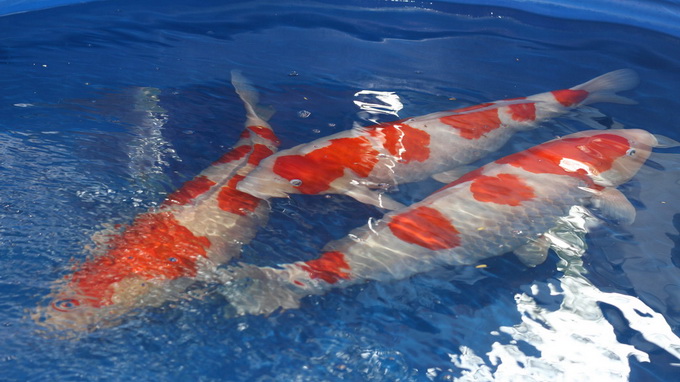Koi fish, nishikigoi in Japanese, can fetch up to US$20,000 apiece and are believed to bring their owners wealth and prosperity. These pets are an emerging, exorbitant indulgence among wealthy locals.
Literally meaning “brocaded carp,” the koi is an ornamental variety of domesticated common carp (Cyprinus carpio), kept for decorative purposes in outdoor ponds or water gardens.
Koi varieties are distinguished by their color and scale pattern. Their brilliant scales are white, black, red, yellow, blue, and cream. The most popular type of koi is the Gosanke.
Koi have long been considered symbolic of harmony, ambition, and patience, all attributes integral to success.
Big, gorgeous, and aged koi are also believed to be synonymous with auspicious “feng shui,” prosperity, and wealth for their owners.
Koi are considered the national fish of Japan. Known for their remarkable friendliness, a school of fish happily swim towards their owner and love to be petted just like dogs or cats.
The pioneering koi farmer
With their high price, koi are a desirable fish to raise, but the practice does not come without its challenges.
The first pioneers of koi farming in Ho Chi Minh City had a tough time as the industry was in its infancy.
In early 2007, an uncultivated plot of land along the Saigon River in Cu Chi district was reclaimed by more than 30 people who worked for Le Huu Dung, or Dung “fish”, the CEO of Hai Thanh Koi Farm.
Considered “dead land,” the plot was plagued by year-round flooding, inaccessibility, and heavily infested with snakes, centipedes, and leeches.
According to Bui Kim Quyet, 33, one of the workers, they feared the dendrelaphis the most--a kind of tree snake, that dangled in profusion in forests.
Workers had to walk several kilometers from the road to the koi farm as no “xe om” (motorbike taxi) drivers dared to take customers deep into the forest for fear of being robbed.
After two years, Dung’s 20-hectare koi farm came into being, which local authorities considered an auspicious sign for the local agriculture.
In 2009, Dung joined a koi auction at the Motorato Koi Farm in Okayama, Japan, where the country’s premium pedigree fish were offered for sale. Dung’s presence at such a large-scale koi auction was unprecedented, as Vietnam had not yet entered the world’s koi farming market.
To the seasoned international farmers’ surprise, Dung, the newcomer, offered the highest bid, $12,000, for the most gorgeous koi at the auction and won it. The young champion, of “showa” species, was some 48cm long. Its mother, an impressive 116cm long, has pocketed several prestigious awards.
He also purchased eight other purebred fish, which are now all thriving and breeding well at his farm. The “showa” champion now measures some 90cm in length.
By adopting hi-tech farming techniques, Dung’s company has successfully bred and sold a considerable number of koi, several of which fetch some $10,000 apiece. He even imported fish worth more than $20,000 each following clients’ demands.
In Vietnam, the preferred species of koi include “kohaku,” “tancho,” “showa,” and “sanke.”
A koi is considered beautiful based on over 20 benchmarks, including shape, head, fins, scales, tail, and origin. A prize koi is submarine-shaped with a standard weight, striking, well-patterned scales, and a distinct color.
A 6-kg mother koi can give birth to some 1 million fry with forced breeding. However, a mere 0.2-0.5% of the young fish is fit for sale.
A standard aquarium with some 10 purebred koi currently fetches a whopping $50,000-300,000 on the local market. Local koi buffs are willing to pay even more for the best fish. All imported fish must have the necessary papers of origin.
Limited clientele
However, not many locals can indulge in the luxury.
According to the HCMC Department of Agriculture and Rural Development, only 10 companies in HCMC farm koi. However, as koi clients are limited to the wealthy while companies are yet to penetrate foreign markets, several have failed and switched to more affordable breeds. Currently only three local companies, including Dung’s, farm koi extensively.
Some have earned permits to export their fish to the US. However, exports have been disrupted by the importer’s demanding technical requirements.
According to the HCMC agriculture department’s statistics, there have been no official export contracts to fastidious markets like America and European countries since early 2012.
Some companies said that they’re stepping up efforts to export their koi to the US by mid-2014, hoping that the fish, which are being raised under the strictest safety procedures, will satisfy the stringent demands of the market. The export will earn them roughly $1.5 million each month.
Recently, to expand their local market shares and cater to lower-income koi enthusiasts, local companies have produced increasing amounts of hybrids and smaller purebreds. They range from VND50,000 ($2) to VND2 million ($96) apiece.
Most koi at the city’s major ornamental fish markets such as that on District 3’s Nguyen Thong Street and District 5’s Luu Xuan Tin market are also low-priced hybrids, which mostly come from family farms or are imported from China.
The cheaper koi make the luxury something students and those with lower incomes can afford. These people often form koi clubs where they can exchange information and experiences in fish caretaking and breeding.
Nguyen Hoang Tuan, 22, of District 12, has seven hybrid koi, which he bought for VND300-400,000 each. One of them gave birth to a school of fry.
He shared that admiring and taking care of the koi, his favorite ornamental fish, is a great way to relieve stress.





















































